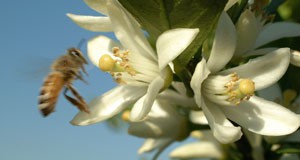 The key to a prospering pollination service is proper promotion, honest, quality service, and a written contract. This contract would detail the expectations of both the beekeeper and the grower. This 4-page fact sheet provides a suggested pollination agreement. Written by Malcolm T. Sanford, Jeanette Klopchin, and James Ellis, and published by the UF Department of Entomology and Nematology, March 2015. (UF/IFAS Photo: Thomas Wright)
The key to a prospering pollination service is proper promotion, honest, quality service, and a written contract. This contract would detail the expectations of both the beekeeper and the grower. This 4-page fact sheet provides a suggested pollination agreement. Written by Malcolm T. Sanford, Jeanette Klopchin, and James Ellis, and published by the UF Department of Entomology and Nematology, March 2015. (UF/IFAS Photo: Thomas Wright)
http://edis.ifas.ufl.edu/aa169
Tag: Jeanette Klopchin
Robbing Behavior in Honey Bees
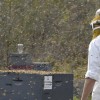 Western honey bee workers can invade and steal honey/nectar from other colonies or sugar/corn syrup from feeders used to deliver syrup to other colonies. This is called “robbing” behavior. Robbing behavior typically involves the collection of nectar and honey, but not pollen or brood. Some beekeepers report that robbing bees may steal wax or propolis from other hives, but there is not much data available on this occurrence. Robbing behavior can escalate quickly from just a few bees robbing other colonies to a massive frenzy of bees robbing many colonies in an apiary. This 3-page fact sheet was written by Ryan Willingham, Jeanette Klopchin, and James Ellis, and published by the UF Department of Entomology and Nematology, February 2015. (Photo Credit: UF/HBREL)
Western honey bee workers can invade and steal honey/nectar from other colonies or sugar/corn syrup from feeders used to deliver syrup to other colonies. This is called “robbing” behavior. Robbing behavior typically involves the collection of nectar and honey, but not pollen or brood. Some beekeepers report that robbing bees may steal wax or propolis from other hives, but there is not much data available on this occurrence. Robbing behavior can escalate quickly from just a few bees robbing other colonies to a massive frenzy of bees robbing many colonies in an apiary. This 3-page fact sheet was written by Ryan Willingham, Jeanette Klopchin, and James Ellis, and published by the UF Department of Entomology and Nematology, February 2015. (Photo Credit: UF/HBREL)
http://edis.ifas.ufl.edu/in1064
Wedge-Shaped Beetles (suggested common name) Ripiphorus spp. (Insecta: Coleoptera: Ripiphoridae)
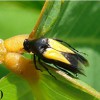 Ripiphoridae are a family of unusual parasitic beetles that are thought to be related to tumbling flower beetles and blister beetles. They parasitize bees and wasps, roaches, and wood-boring beetles, but specific hosts for many ripiphorid species are unknown. Their secretive life cycle makes an assessment of their economic and ecological impact very difficult. Additional research is necessary to determine the abundance and impact of Ripiphorus species. This 4-page fact sheet was written by David Owens, Ashley N. Mortensen, Jeanette Klopchin, William Kern, and Jamie D. Ellis, and published by the UF Department of Entomology and Nematology, December 2014.
Ripiphoridae are a family of unusual parasitic beetles that are thought to be related to tumbling flower beetles and blister beetles. They parasitize bees and wasps, roaches, and wood-boring beetles, but specific hosts for many ripiphorid species are unknown. Their secretive life cycle makes an assessment of their economic and ecological impact very difficult. Additional research is necessary to determine the abundance and impact of Ripiphorus species. This 4-page fact sheet was written by David Owens, Ashley N. Mortensen, Jeanette Klopchin, William Kern, and Jamie D. Ellis, and published by the UF Department of Entomology and Nematology, December 2014.
http://edis.ifas.ufl.edu/in1069
Minimizing Honey Bee Exposure to Pesticides
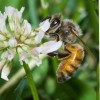 Protecting honey bees and other pollinators from pesticide impacts is important to the sustainability of agriculture. Consequently, pesticide applicators must determine if there is a clear hazard to managed or wild populations of bees. Potential exposure of bees to pesticides can vary greatly depending on the type of pesticide, formulation, application method, label restrictions, and other factors. The goal in using a pesticide is to achieve maximum benefit (success) with minimum negative impact, and these factors should always be considered in pesticide selection. This publication is written (1) to help assure the sustainability of both bees and agriculture by informing beekeepers, pesticide users, and the general public about the often complex relationship between pollinators (specifically bees) and pesticides, (2) to offer guidance for improved communication between beekeepers and pesticide users, (3) to offer pollinator risk-reducing strategies for growers and other applicators when using pesticides, and (4) to provide clarity in laws, labeling, and associated definitions. This 14-page fact sheet was written by J. D. Ellis, J. Klopchin, E. Buss, F. M. Fishel, W. H. Kern, C. Mannion, E. McAvoy, L. S. Osborne, M. Rogers, M. Sanford, H. Smith, P. Stansly, L. Stelinski, and S. Webb, and published by the UF Department of Entomology and Nematology, March 2014.
Protecting honey bees and other pollinators from pesticide impacts is important to the sustainability of agriculture. Consequently, pesticide applicators must determine if there is a clear hazard to managed or wild populations of bees. Potential exposure of bees to pesticides can vary greatly depending on the type of pesticide, formulation, application method, label restrictions, and other factors. The goal in using a pesticide is to achieve maximum benefit (success) with minimum negative impact, and these factors should always be considered in pesticide selection. This publication is written (1) to help assure the sustainability of both bees and agriculture by informing beekeepers, pesticide users, and the general public about the often complex relationship between pollinators (specifically bees) and pesticides, (2) to offer guidance for improved communication between beekeepers and pesticide users, (3) to offer pollinator risk-reducing strategies for growers and other applicators when using pesticides, and (4) to provide clarity in laws, labeling, and associated definitions. This 14-page fact sheet was written by J. D. Ellis, J. Klopchin, E. Buss, F. M. Fishel, W. H. Kern, C. Mannion, E. McAvoy, L. S. Osborne, M. Rogers, M. Sanford, H. Smith, P. Stansly, L. Stelinski, and S. Webb, and published by the UF Department of Entomology and Nematology, March 2014.
http://edis.ifas.ufl.edu/in1027
Florida Master Beekeeper Program Requirements
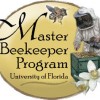 The Master Beekeeper Program (MBP) is a five-year (minimum) beekeeper training and certification program provided by the University of Florida. One must already be a beekeeper to enter the program. This 22-page fact sheet was written by James Ellis, Jerry Hayes, Catherine Zettel Nalen, William H. Kern, Ray Zerba, Brad Burbaugh, and Jeanette Klopchin, and published by the UF Department of Entomology and Nematology, October 2013.
The Master Beekeeper Program (MBP) is a five-year (minimum) beekeeper training and certification program provided by the University of Florida. One must already be a beekeeper to enter the program. This 22-page fact sheet was written by James Ellis, Jerry Hayes, Catherine Zettel Nalen, William H. Kern, Ray Zerba, Brad Burbaugh, and Jeanette Klopchin, and published by the UF Department of Entomology and Nematology, October 2013.
http://edis.ifas.ufl.edu/in847
Infant Botulism and Honey (ENY128/AA142)
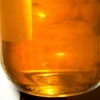 Since honey is a potential and avoidable source of Clostridium botulinum spores, the Center for Disease Control and Prevention, the American Academy of Pediatricsm and the National Honey Board recommend that honey not be given to infants younger than 12 months of age. Honey should not be added to water, food, or formula fed to infants under 12 months of age. This 2-page fact sheet was written by Malcolm T. Sanford, Eddie Atkinson, Jeanette Klopchin, and Jamie Ellis, and published by the UF Department of Entomology and Nematology, June 2013.
Since honey is a potential and avoidable source of Clostridium botulinum spores, the Center for Disease Control and Prevention, the American Academy of Pediatricsm and the National Honey Board recommend that honey not be given to infants younger than 12 months of age. Honey should not be added to water, food, or formula fed to infants under 12 months of age. This 2-page fact sheet was written by Malcolm T. Sanford, Eddie Atkinson, Jeanette Klopchin, and Jamie Ellis, and published by the UF Department of Entomology and Nematology, June 2013.
http://edis.ifas.ufl.edu/aa142